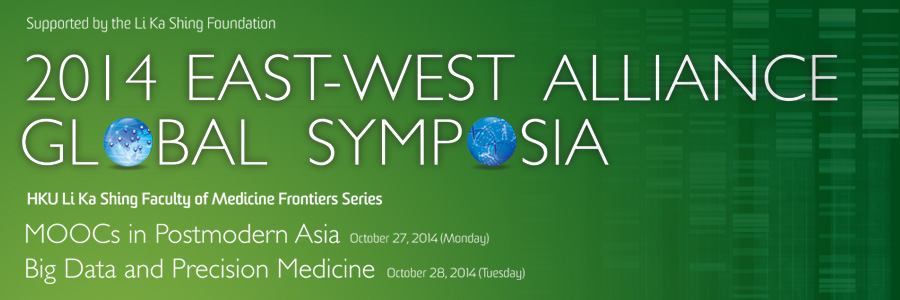
| Welcome Message | |
|
Welcome message It gives me huge pleasure to welcome academics and practitioners in medical education, clinical practice and science from all over the world to attend the HKU Li Ka Shing Faculty of Medicine Frontiers Series, hosted on behalf of the East-West Alliance by the University of Hong Kong on October 27-28, 2014. These flagship Global Symposia aim to foster knowledge exchange and collaboration around two key developments that have the potential to revolutionise education and clinical practice. They deal with the massive and the big – Massive Open Online Courses (MOOCs), and Big Data and Precision Medicine. But ultimately they hold the prospect of offering a more individualised education for the student and personalised care and treatment for the patient. These developments lend themselves to, and indeed require, international collaboration, and are hence fitting topics for the East-West Alliance, as well as for our wider partnerships with our co-organisers, London School of Hygiene and Tropical Medicine (LSHTM) and China Medical Board (CMB). The first in this year’s series, MOOCs in Postmodern Asia, explores the rapid rise of technology-accelerated learning. There has been much debate about the role of this innovation, even concern that it could undermine the traditional academic and university. In this symposium, we will see how MOOCs can enhance the learning experience by providing access to the very best teachers in their specialist fields of expertise – wherever they are based. And we can do this collaboratively, pooling our strengths and bringing together peers from across countries, institutions and disciplines. This has been the approach for HKU’s first MOOC, launched this September. “Epidemics” is co-taught by experts from HKU, LSHTM and Harvard University, and draws on Hong Kong’s frontline experience from Severe Acute Respiratory Syndrome (SARS) to avian influenza (A) H7N9. The second symposium takes us to another exciting frontier – Big Data and Precision Medicine. Data can be both big and personal, for better if judiciously deployed and for poorer if blindly applied as all too often happens during the present formative stage of almost Brownian diffusion. In this instance, we will see how Big Data now allow us to delve with new precision into the unique and the different, for every person, whether we are making use of it for genomic medicine, addressing cancers and other organ-specific diseases or managing population health. These are just some examples of topics that could reshape the future of medicine, to be addressed by leading experts in Big Data/Precision Medicine from North America, Europe, East Asia and Hong Kong during the symposium. The Li Ka Shing Faculty of Medicine is proud to host these important Global Symposia, and deeply grateful for the generosity of the Li Ka Shing Foundation for making it possible, and for the support of our partners and participants in ensuring we stay ahead at the frontiers of education and medicine.
|

